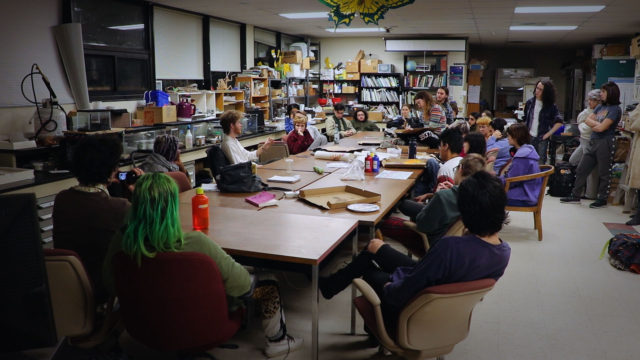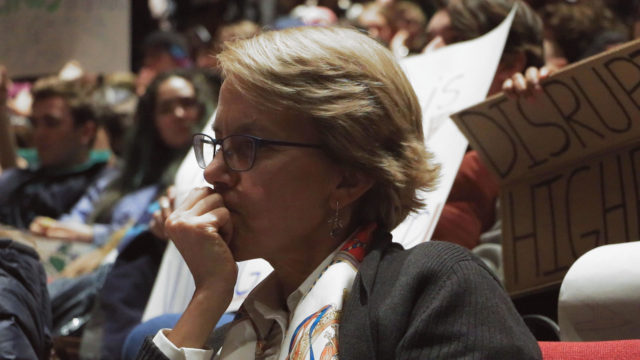
Students occupy offices in documentary The Unmaking of a College
THE UNMAKING OF A COLLEGE: THE STORY OF A MOVEMENT (Amy Goldstein, 2021)
IFC Center
323 Sixth Ave. at West Third St.
Opens Friday, February 11
www.ifccenter.com
“One can worry that if Hampshire is failing, what does that mean for liberal arts education in general?” Sloan Foundation president Adam Falk asks in Amy Goldstein’s passionate documentary, The Unmaking of a College: The Story of a Movement. A graduate of the innovative, experimental independent Hampshire College, which opened its doors in 1970, Goldstein follows a months-long sit-in orchestrated by students upon learning that the institution was in danger of closing.
On January 15, 2019, new college president Miriam “Mim” Nelson sent out a letter advising of an important meeting being held in forty-nine minutes. At that meeting, which many people could not attend because of the late notice, she announced that the school was looking for a “strategic partner” and that there was likely going to be no incoming class in the fall. Students, teachers, and even members of the board of directors took action, demanding answers. When none came, the students occupied several offices, including Nelson’s, as they crusaded for their rights, attempting to save the liberal arts college, which had a relatively low endowment and relied primarily on tuition, which was high.
Columbia University professor Andrew Delbanco explains, “We are about to see a great shrinkage in the number of colleges and universities in this country because only the wealthiest will be able to survive. And it’s inevitable, I think, that fragile colleges are going to face the possibility of going out of business.”
Among the students Goldstein talks to are Marlon Becerra; Cheyenne Palacio-McCarthy; Andrew Gordon; Moon West; Annie Wood; Joshua Berman, who took extensive footage of various events and gatherings; and Rhys MacArthur, who works in the admissions office. They are often photographed in front of a large screen with campus footage projected over them, evoking how all-encompassing the situation is; they are not just battling for their education but for their future careers and life.
“Students have always been a huge part of how this college runs. I remember occupying the president’s office, but I don’t remember why. I mean, that’s just in our blood,” Hampshire alum and master documentarian Ken Burns notes. “At one point it seemed like the story is that Hampshire College is dead. I am happy to say that rumors of our death are greatly exaggerated.”
Nelson doesn’t back down even as the press gets hold of the story and some questionable behind-the-scenes negotiations are revealed. Sitting on the floor of her office, surrounded by students, Nelson tells them, “I just have to say, I feel like I’m in an alternative universe here. I am working so f’ing hard. I am fighting like you can’t even imagine to maintain our independence. It’s critical. So I’m looking at all of these things.”
Student Nya Johnson immediately responds, “You get paid to work f’ing hard. So work. Do your work. We pay you to do this. I don’t know; I’m just confused. What alternative universe are you living in?”
Hampshire has a history of activism and providing students with a nontraditional education. Fear of a merger with one of its sister schools, Amherst, Smith, Mount Holyoke, or UMass, worries students and faculty; professors are concerned with what would happen to them, particularly as potential layoffs loom. However, as Hampshire professor Salman Hameed declares about Nelson, “She picked the wrong college to mess with.”

Hampshire College president Miriam “Mim” Nelson finds herself under fire in Amy Goldstein doc
Goldstein (Kate Nash: Underestimate the Girl, Self-Made Men) also speaks with Hampshire Gazette reporter Dusty Christensen, Science magazine editor in chief Holden Thorp, former college president Adele Simmons, lead fundraiser Cheri Butler, and Hampshire board of trustees member Mingda Zhao, who each offers a unique perspective on the conflict.
Hampshire professor Margaret Cerullo writes an article for The Nation detailing what is happening; she titles it “The Unmaking of a College: Notes from Inside the Hampshire Runaway Train,” a riff on the school’s original manifesto, The Making of a College. Yale School of Management associate dean Jeffrey Sonnenfeld announces, “This was very badly handled.” The only person who speaks up for Nelson is Hampshire alum and conservative Subject Matter PR firm CEO John Buckley, who was hired by Nelson to help handle the crisis. “I saw a woman who was trying to do the right thing who got caught and made some mistakes, and then everything unraveled really, really badly,” he says.
Hampshire’s motto is “Non satis scire” — “To know is not enough.” The students’ nonviolent campaign for transparency, involvement, and agency, to know the truth and be part of the solution, is inspiring; many of them are learning lessons that will help them on their life’s journey while also finding out there can be lies and betrayal on that road. In many ways, the film serves as a primer for the future as the next generation prepares to eventually take over a torn and tattered America — and it all begins with education.
The Unmaking of a College: The Story of a Movement opens February 11 at IFC Center; Goldstein will be on hand for a Q&A with some of the film’s subjects following the 7:50 show.